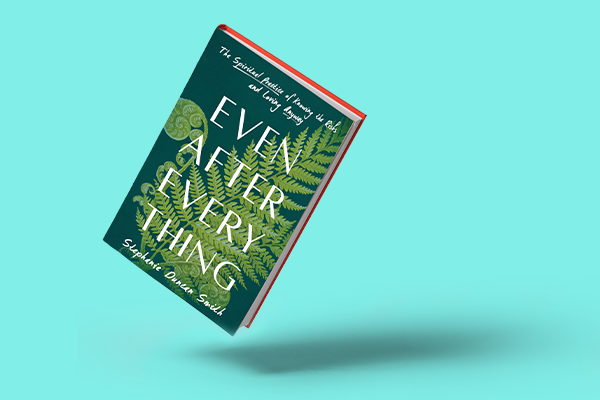IF YOU WROTE down your past year’s most significant personal joys and losses on a timeline, how might they line up with the liturgical calendar — Advent, Christmas, Epiphany, Lent, Holy Week, Eastertide, and Ordinary Time? Placing these two calendars side by side, what might you find? Stephanie Duncan Smith digs into these questions in her memoir Even After Everything. For Duncan Smith — and likely for most of us — “Sometimes our personal moments converge with these natural and sacred seasons in profound, meaning-rich ways. And sometimes they clash with unbearable disparity.”
Duncan Smith shares her own story of loss and love with unflinching honesty, even and especially where it seems to clash with the Christian story. The places of dissonance are, for her, both a “dizzying problem” and a “place of divine encounter.” She invites us to dive into the dissonance with her as she wrestles out a sort of reconciliation — a renewed understanding of the Christian story that makes room, so much room, for every human grief. “The promise has never been smooth nor safe passage,” Duncan Smith writes. “The divine promise is presence.”
In a world that often wants us to move on quickly from our personal traumas — and from our collective traumas, such as living through the COVID-19 pandemic — Duncan Smith slows down the pace. “We become more human when we choose not to make less of our pain,” Duncan Smith writes. She invites us into deeper embodiment and real resilience — the kind we find “in the soul-stretching acceptance of reality as it is, and the active resistance of toxic positivity as well as the defeatism of despair.”
Even as a feminist writer, I found myself surprised by how thoroughly, viscerally, and vulnerably Duncan Smith engages with the specific experiences of female bodies. In her case, this has meant pregnancy loss, pregnancy, birth, and postpartum life as a new mother. While reading, I wondered at times, “Will cisgender men be able to relate to a book that centers pregnancy so much?” And then I thought, “What part of me has, unbidden, bought into the lie that men’s experiences engage the human condition as a whole, whereas women’s experiences only connect with fellow women?”
Women’s bodies are integral to every part of our sacred story. Duncan Smith makes this case well, from Advent, the anticipation of a momentous birth; to Christmas, a gritty birth story; to Epiphany, a time that “held the vulnerability of a newborn God, a postpartum teenager, and an entire world reborn into a new age,” and beyond.
While we each experience embodiment differently, we all walk through our own cycles of “deep griefs, great joys, and unsettling in-betweens.” For those steeped in the liturgical calendar, Duncan Smith adds thoughtful layers of reflection to each season. For those less familiar with these historic church rhythms, this book introduces an ancient part of the Christian tradition. For all who have experienced the dissonance of feeling one thing while church or culture demands that we perform another, this book may serve as a healing balm.

Got something to say about what you're reading? We value your feedback!

